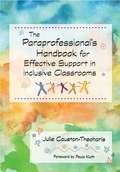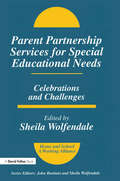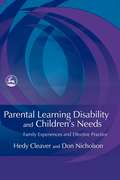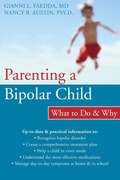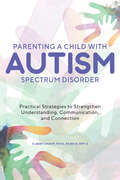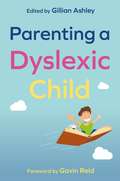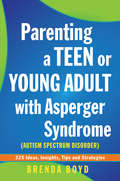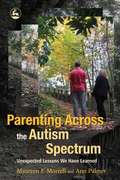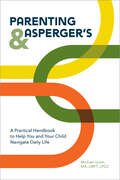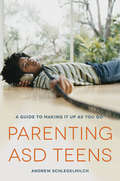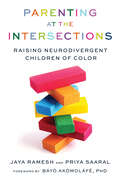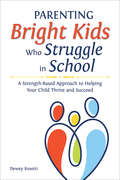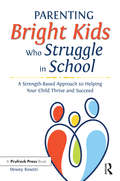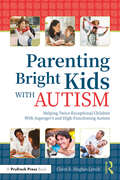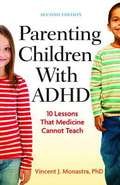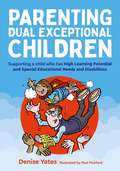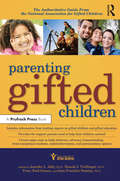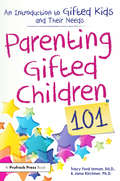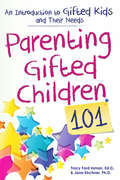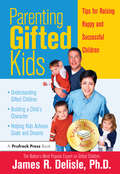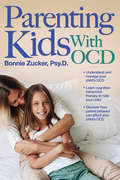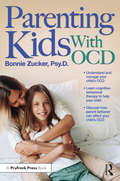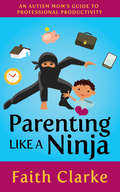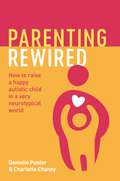- Table View
- List View
The Paraprofessional's Handbook For Effective Support In Inclusive Classrooms
by Julie Causton-TheoharisWhat does a great paraprofessional need to know and do? Find out in this handy survival guide, equally useful for the brand-new paraprofessional or the 20-year classroom veteran. Packed with friendly guidance, practical tips, and relatable first-person stories, this book reveals the best ways to provide effective, respectful services to students in inclusive classrooms. Julie Causton-Theoharis, a teacher, professor, and educational consultant with more than 10 years of experience as a paraprofessional instructor, knows exactly how to help readers stop feeling overwhelmed so they can start making a difference. She answers all the urgent questions paraprofessionals have as they navigate their complex job in the inclusive classroom, showing readers how to: provide skillful and subtle support to students while encouraging their independence resolve challenging behavior in gentle and positive ways find students' strengths and match support practices to them fade their support make informed decisions about content-specific accommodations, modifications, and adaptations presume competence and keep expectations high facilitate peer supports and friendships partner with teachers, SLPs, psychologists, families, and other members of the educational team relieve their own stress and avoid burnout To help them master the daily ups and downs of the inclusive classroom, paraprofessionals will get ready-to-use practical content: tips for supporting students with specific disabilities, helpful question-and-answer sections, examples of successful problem-solving, a quick-guide to acronyms in education, easy ideas for improving teamwork, and more. The essential guide for every paraprofessional and a must-have for the educators and other professionals who support them this empowering book takes the guesswork out of a critical classroom role and helps students with disabilities reach their full potential.
A Paraprofessional's Handbook for Working with Students Who Are Visually Impaired
by Cyral Miller Nancy LevackThis book was written to help increase the effectiveness of paraprofessionals and identify ways to help them work with the visually impaired. It stresses team work with other education professionals and gives first hand suggestions to overcome challenges to help the student grow.
Parent Partnership Services for Special Educational Needs: Celebrations and Challenges
by Sheila WolfendaleThis book gives a clear understanding of the growth and operation of special educational needs Parent Partnership Services (PPSs). The reader will find an explanation of the broader national and legal context of PPSs, followed by contributions written by Parent Partnership Coordinators and parent workers in various regions. They describe what they actually do, including their work with and support for parents and carers of children with special educational needs. The book includes information on the latest special needs and disability rights legislation; descriptions of innovative good practice in setting up and operating PPSs; case studies from practitioners; advice on how to liaise effectively with other professionals and agencies; guidance on giving and receiving training, especially for independent parental supporters (IPSs); and ways of implementing disagreement resolution schemes. Parent Partnership Coordinators will find this book particularly useful. Special Educational Needs Coordinators, SENCOs, educational psychologists, IPSs and parents will also find it a relevant and timely publication.
Parental Learning Disability and Children's Needs: Family Experiences and Effective Practice
by Hedy Cleaver Don NicholsonParental Learning Disability and Children's Needs explores how to effectively assess children in families where one or more parent has a learning disability. These children often have unmet needs because their parents are more likely to be coping with mental and physical illness, domestic violence or substance abuse. The book examines current social care practice in this area, whether it is working, and the impact it has on families. The authors describe how, although some parents with a learning disability face a significant risk of losing their children, most continue to look after them and, while support provided by social services and other agencies, can be significant it is rarely sustained and the health and welfare of many children suffers as a result. Case studies and interviews from original research support the authors' recommendations for policy and practice to combat these problems. This book will prove to be an invaluable source of information for all social workers and other professionals working with someone who is both a parent and has a learning disability.
Parenting a Bipolar Child: What To Do And Why
by Gianni Faedda Nancy AustinTwo preeminent researchers and clinicians specializing in the treatment of child-onset bipolar disorder offer the first and only step-by-step guide for parents, a comprehensive approach to helping a child with bipolar disorder by integrating professional medical treatment with behavior regulation, problem solving, positive reinforcement, and limit setting techniques.
Parenting a Child with Autism Spectrum Disorder: Practical Strategies to Strengthen Understanding, Communication, and Connection
by Albert KnappPractical and compassionate strategies to help your child with autism spectrum disorder thrive Get the guidance you need to meet the challenges of raising an exceptional child. Parenting a Child with Autism Spectrum Disorder offers several approaches to help you effectively and respectfully manage everyday situations. Cut down on stress with practical advice drawn from clinical knowledge. Whether building a personal support network, creating safe environments, or navigating your child's relationship with others, you'll discover a variety of ways to set your child and yourself up for success in Parenting a Child with Autism Spectrum Disorder. Parenting a Child with Autism Spectrum Disorder includes: Easy-to-use advice—Find out how to help your child deal with a variety of situations, including home life, family outings, and educational opportunities. Real-life case studies—Gain insight into the use of this book's strategies with the help of examples drawn from real-life case studies. Advocacy and communication tips—Learn ways to better communicate with your child as well as advocate for their unique needs. Get a helping hand in finding the best ways to support your child with autism spectrum disorder.
Parenting a Dyslexic Child
by Lindsay Peer Katrina Cochrane Helen Ross Pennie Aston Adam GordonDrawing on the expert knowledge and research gathered by the British Dyslexia Association, this is a complete guide to parenting a child with dyslexia. Covering assessment, diagnosis, home and school support, emotional development and more, this empowering book has everything you need to help your child reach their full potential.With accessible guidance on reading, writing, spelling, organisation and study skills, this book will also help you to build self-belief in your child whilst ensuring that you care for yourself along the way. This book provides clear information on how dyslexia affects children and families at all stages of life, with insights on communicating with schools and ensuring the best support in all environments.
Parenting a Teen or Young Adult with Asperger Syndrome (Autism Spectrum Disorder): 325 Ideas, Insights, Tips and Strategies
by Brenda Boyd325 astute and practical ideas, insights, tips and strategies address the complex issues parents face during this crucial period of transition for their child with Asperger Syndrome (Autism Spectrum Disorder). The practical, bite-size suggestions focus on the vital importance of developing and nurturing an open and healthy relationship with your son or daughter. The easy-to-navigate format will suit busy parents wanting to locate advice to suit their particular needs. All the suggestions are designed to foster understanding and acceptance between family members and help the AS young person with common problem areas such as social vulnerability and peer relationships, self-esteem, anxiety and coping with change. This will be an invaluable companion for parents, carers and family members of an adolescent or young adult with AS.
Parenting Across the Autism Spectrum: Unexpected Lessons We Have Learned
by Ann Palmer Maureen MorrellMaureen F. Morrell and Ann Palmer are raising two very different children: Justin, a whirlwind of activity and mood swings, who is supervised in a residential farm community, and Eric, quiet and passive, who lives independently at college. The authors give an account of the striking similarities as well as the stark differences in their experiences of parenting children at opposite extremes of the autism spectrum. The two mothers speak openly about their children's diagnosis and early childhood through to adolescence, young adulthood and the day they leave home. They give a moving account of the challenges they faced and the surprising consolations they found along their sons' very different paths in life. Through their friendship and two decades of shared experiences of parenting an ASD child, each has gained a clear understanding of her own strengths and limitations, as well as those of her child. Parenting Across the Autism Spectrum offers a personal perspective and practical guidance for parents at the start of their journey with autism, especially those whose children are newly diagnosed. It also provides useful insights for professionals working with individuals across the autism spectrum and their families. The book was elected the 2007 Autism Society of America's Outstanding Literary Work of the Year.
Parenting and Asperger's: A Practical Handbook To Help You and Your Child Navigate Daily Life
by Michael UramEveryday parenting techniques to support kids ages 6 to 16 with Asperger's Raising a child with Asperger's can be both exciting and challenging. This book equips you with the confidence and tools to help them better communicate, understand social cues, and adapt to changes. You'll learn how Asperger's fits into the Autism spectrum, even though it's no longer a formal diagnosis, and find evidence-based strategies you can use at home, school, and beyond to make it easier for kids to succeed. Important first steps—Learn about the process of getting a diagnosis, and explore different methods of therapy, like Applied Behavior Analysis and Cognitive Behavioral Therapy. Helpful and realistic strategies—Find techniques to help kindergarteners and high schoolers alike navigate tasks such as leaving on time, practicing good hygiene, attending special events, and more. Resources for parents—Determine the best ways to advocate for your child at school, connect with other parents in the same situation, and balance your own needs as well as the needs of the rest of your family. Discover actionable, expert advice for helping your child thrive.
Parenting ASD Teens: A Guide to Making it Up As You Go
by Andrew SchlegelmilchThis straight-talking and accessible guide for parents of teenagers on the autism spectrum provides down-to-earth advice on coping with the more difficult issues that can arise at home and school during the adolescent years. Andrew Schlegelmilch discusses common parenting challenges and offers advice drawn from his extensive experience working with teenagers with autism and their families as Head Psychologist at a college preparatory school. He offers parents professional guidance on what to do about falling grades, how to handle adolescent tantrums, how to talk about sex and sexuality with your child, how to help your child with peer relationships, how to keep your child safe online, and what to do if you suspect your child has mental health problems. Integral to the discussion is how to set realistic expectations and encourage independence in ways that work for both your child with autism and the rest of the family, as well as how to make the best use of the help professionals can offer.
Parenting at the Intersections: Raising Neurodivergent Children of Color
by Jaya Ramesh Priya Saaral Bayo Akomolafe"This is an invaluable, nuanced, and deeply needed guide to parenting diverse children as we move, together, toward a future in which all brains and bodies are supported—and belong." —Jessica McCabe, How to ADHDWhat if parenting were an act of social justice? In this part story-telling, part self-inquiry book, authors and therapists Jaya Ramesh and Priya Saaral situate parenting children of color with neurodivergence within the context of various interlocking systems of oppression including settler colonialism, White supremacy, ableism, and capitalism. These intersections engender isolation and loneliness. Using the voices of parents on the front lines and other experts, Parenting at the Intersections offer an invitation to parents to slow down and reflect on their own parenting journeys.When parents can be given space to listen to their own voices, to connect with their children, and find community with others, they can find the most radical ways to disrupt systems of oppression.
Parenting Bright Kids Who Struggle in School: A Strength-Based Approach to Helping Your Child Thrive and Succeed
by Dewey RosettiParenting Bright Kids Who Struggle in School guides parents through the challenging and often unfamiliar landscape of raising kids who have been labeled with learning differences, including dyslexia, ADHD, autism, sensory processing disorder, and more. This book:Builds upon Harvard professor Todd Rose's groundbreaking research in the "Science of Individuality."Helps parents target their child's jagged profile of strengths and weaknesses.Explains a child's context of learning and multiple pathways.Teaches revolutionary techniques to encourage strengths and mitigate weaknesses.Helps parents manage the emotional fallout of raising a child who does not conform to the "average" model of learning.Drawing from her own experience as a parent of a child with learning differences—who is now a highly successful adult—the author outlines clear lessons from a quarter century of advocating for kids who learn differently.
Parenting Bright Kids Who Struggle in School: A Strength-Based Approach to Helping Your Child Thrive and Succeed
by Dewey RosettiParenting Bright Kids Who Struggle in School guides parents through the challenging and often unfamiliar landscape of raising kids who have been labeled with learning differences, including dyslexia, ADHD, autism, sensory processing disorder, and more. This book:Builds upon Harvard professor Todd Rose's groundbreaking research in the "Science of Individuality."Helps parents target their child's jagged profile of strengths and weaknesses.Explains a child's context of learning and multiple pathways.Teaches revolutionary techniques to encourage strengths and mitigate weaknesses.Helps parents manage the emotional fallout of raising a child who does not conform to the "average" model of learning. Drawing from her own experience as a parent of a child with learning differences—who is now a highly successful adult—the author outlines clear lessons from a quarter century of advocating for kids who learn differently.
Parenting Bright Kids With Autism: Helping Twice-Exceptional Children With Asperger's and High-Functioning Autism
by Claire E. Hughes-LynchParenting Bright Kids With Autism discusses the frustrations, the diagnoses, the challenges, and the joys as parents help their gifted children with autism spectrum disorders (ASD) thrive in school and at home. This book: Helps families navigate twice-exceptional life by translating best practice into helpful advice. Guides parents who are trying to reach out, find information, and develop their child's talents. Helps parents acknowledge and get help for, but not focus on, areas of challenge. Is written by a professor of special education who is also a mother of a gifted child with high-functioning autism. Is a revision of the popular Children With High-Functioning Autism. Topics range from understanding the first signs of autism and the diagnosis, finding a support network, and filling out necessary paperwork, to determining the various types of therapies available and planning for adulthood. The book also discusses issues that these kids may face as they become teenagers and enter college. With the advice and encouragement provided in this book, parents will receive valuable insight into this new world of caring for a gifted child with autism.
Parenting Children with ADHD: 10 Lessons that Medicine Cannot Teach (Second Edition)
by Vincent J. MonastraIn this second edition of Parenting Children With ADHD, Dr. Vince Monastra provides practical, step-by-step guidance to parents looking for ways to bring out the best in kids with ADHD. He presents updated lessons about the causes of ADHD, how medications work, and the problems that sleep deficits, poor nutrition, and other medical disorders can cause. He also shares his innovative approach for improving organization, task-completion, problem-solving and emotional control.
Parenting Dual Exceptional Children: Supporting a Child who Has High Learning Potential and Special Educational Needs and Disabilities
by Denise YatesThis is the first comprehensive guide for parents of children with Dual and Multiple Exceptionality (DME, sometimes called Twice Exceptionality or 2E). Children with high learning potential may also have conditions such as ASD, ADHD, dyslexia and dyspraxia, having 'flashes of brilliance' in some areas whilst needing additional support in others. As a result, their abilities may not always be recognised in an educational setting.This book takes a strengths-based approach towards helping parents recognise and focus on their child's areas of potential to support them towards better attainment and self-esteem, and build on these abilities while also identifying and addressing areas of difficulty. It provides an understanding of the mixed learning profile of DME children, explaining why they excel in some areas but not others, as well as guidance for parents on working positively with schools and providing their child with the support they need.With stories, quotes from parents and examples throughout, this is an essential guide to helping DME children achieve their full untapped potential.
Parenting Gifted Children: The Authoritative Guide From the National Association for Gifted Children
by Jennifer L. Jolly Donald J. Treffinger Tracy Ford InmanWhen parents need the most authoritative information on raising gifted kids, they can turn to Parenting Gifted Children: The Authoritative Guide From the National Association for Gifted Children, a gifted education Legacy Award winner. This comprehensive guide covers topics such as working with high achievers and young gifted children, acceleration, advocating for talented students, serving as role models and mentors for gifted kids, homeschooling, underachievement, twice-exceptional students, and postsecondary opportunities.The only book of its kind, this guidebook will allow parents to find the support and resources they need to help their children find success in school and beyond. Written by experts in the field of gifted education and sponsored by the leading organization supporting the education of gifted and advanced learners, this book is sure to provide guidance, advice, and support for any parent of gifted children.Texas Association for the Gifted and Talented 2011 Legacy Book Award Winner - Parenting
Parenting Gifted Children 101: An Introduction to Gifted Kids and Their Needs
by Tracy Ford Inman Jana KirchnerThis practical, easy-to-read book explores the basics of parenting gifted children, truly giving parents the "introductory course" they need to better understand and help their gifted child. Topics include myths about gifted children, characteristics of the gifted, the hows and whys of advocacy, social and emotional issues and needs, strategies for partnering with your child's school, and more. Parenting Gifted Children 101 explores ways for you to help your child at home and maximize your child's educational experience with strategies that are based on research, but easy to implement. Each chapter—from parenting twice-exceptional students to navigating the possible challenges that school may hold for your child—contains resources for further reading and insights from more than 50 parents and educators of gifted children.Texas Association for the Gifted and Talented 2017 Legacy Book Award Winner - Parenting
Parenting Gifted Children 101: An Introduction to Gifted Kids and Their Needs
by Tracy Inman Jana KirchnerThis practical, easy-to-read book explores the basics of parenting gifted children, truly giving parents the "introductory course" they need to better understand and help their gifted child. Topics include myths about gifted children, characteristics of the gifted, the hows and whys of advocacy, social and emotional issues and needs, strategies for partnering with your child's school, and more. Parenting Gifted Children 101 explores ways for you to help your child at home and maximize your child's educational experience with strategies that are based on research, but easy to implement. Each chapter--from parenting twice-exceptional students to navigating the possible challenges that school may hold for your child--contains resources for further reading and insights from more than 50 parents and educators of gifted children.
Parenting Gifted Kids: Tips for Raising Happy and Successful Children
by James DelisleA gifted education Legacy Award winner, Parenting Gifted Kids: Tips for Raising Happy and Successful Children provides a humorous, engaging, and encouraging look at raising gifted children today. James R. Delisle, Ph.D., offers practical, down-to-earth advice that will cause parents to reexamine the ways they perceive and relate to their children.Dr. Delisle puts forward 10 tips to parents of gifted children—ideas that reflect attitude and approach and allow for introspection and change, rather than quick, do-it-tonight solutions. Some topics of interest include understanding a child's giftedness, working with the school system, dealing with perfectionism in gifted kids, and being adult role models for children. Along the way, stories from gifted children and their parents provide insight into the lives of these individuals.What sets this book apart from other books for parents of gifted kids is its expansion beyond mere platitudes. Dr. Delisle's tips go beyond the basics, focusing on attitude, reflection, and subtle changes, rather than specific, cookie-cutter recipes for action. The 10 tips suggested and expanded upon in this book include: understanding what giftedness is . . . and what it is not; understanding the differences between gifted kids and their agemates; understanding the personality traits of gifted kids, including overexcitabilities; taking charge of your child's education; understanding the issue of perfectionism in gifted kids; examining social nuances and myths related to giftedness; examining the similarities parents share with their gifted children; setting reasonable goals; helping gifted children make a difference in the lives of others; and remembering that gifted children are kids first and gifted second.Educational Resource
Parenting Kids With OCD: A Guide to Understanding and Supporting Your Child With OCD
by Bonnie ZuckerParenting Kids With OCD provides parents with a comprehensive understanding of obsessive-compulsive disorder, its symptoms, types, and presentation in children and teens. The treatment of OCD is explained, and guidelines on how to both find appropriate help and best support one's child is provided. Family accommodation is the rule, not the exception, when it comes to childhood OCD; yet, higher accommodating is associated with a worsening of the child's symptoms and greater levels of familial stress. Parents who have awareness of how they can positively or negatively impact their child's OCD can benefit their child's outcome. Case examples are included to illustrate the child's experience with OCD and what effective treatment looks like. OCD worsens when there is increased stress for the child; therefore, stress management is an essential component for improvement. Parents will learn how to manage stress in themselves and encourage effective stress management for their children.
Parenting Kids With OCD: A Guide to Understanding and Supporting Your Child With OCD
by Bonnie ZuckerParenting Kids With OCD provides parents with a comprehensive understanding of obsessive-compulsive disorder, its symptoms, types, and presentation in children and teens. The treatment of OCD is explained, and guidelines on how to both find appropriate help and best support one's child are provided. Family accommodation is the rule, not the exception, when it comes to childhood OCD; yet, higher accommodating is associated with a worsening of the child's symptoms and greater levels of familial stress. Parents who have awareness of how they can positively or negatively impact their child's OCD can benefit their child's outcome. Case examples are included to illustrate the child's experience with OCD and what effective treatment looks like. OCD worsens when there is increased stress for the child; therefore, stress management is an essential component for improvement. Parents will learn how to manage stress in themselves and encourage effective stress management for their children.
Parenting Like a Ninja: An Autism Mom’s Guide to Professional Productivity
by Faith ClarkeParenting Like a Ninja is an authentic discussion of the complexity faced by working autism moms, with clear steps to increase energy and productivity in all areas of work and life. As a mommy of a child with autism, the daily reality of food wars, tantrums, a steady variety of body fluids, erratic non-sleep, and the revolving door of therapists is just exhausting. Autism moms keep it together, but sometimes, they just want the relentless pace of chaotic activity to stop so they can figure out the rest of their life, move ahead with their professional dreams, and just be more productive. In Parenting Like a Ninja, Faith Clarke walks moms through well-established principles of psychological well-being and thriving to create balance and energize their professional productivity, so they can build more of what they have been looking for professionally, all while being able to nurture their child’s well-being.
Parenting Rewired: How to Raise a Happy Autistic Child in a Very Neurotypical World
by Danielle Punter Charlotte ChaneyParenting an autistic child as a neurotypical adult can be challenging but it doesn't need to feel impossible! This essential guide will help you reshape your approaches to parenting.Packed with lived-experience insight and easy-to-follow advice this transformative guide will change how you view the behaviour of your autistic child and challenge you to rewire your thinking to see the world through the autistic lens. This guide challenges the common misunderstandings surrounding autistic behaviour, such as emotional dysregulation in public settings or meltdowns at mealtimes. Parents and carers will be given a deeper understanding of why your child behaves the way they do and how a change in your parenting approach is key to relax and resolve difficult situations. This book gives you all the tools you need to not only parent your autistic child, but also to understand them.With tips on how to support and interpret emotional dysregulation, meltdowns, food aversions and much more, you will learn how to see the world through your child's eyes, using communication techniques that will help you and your child thrive.
